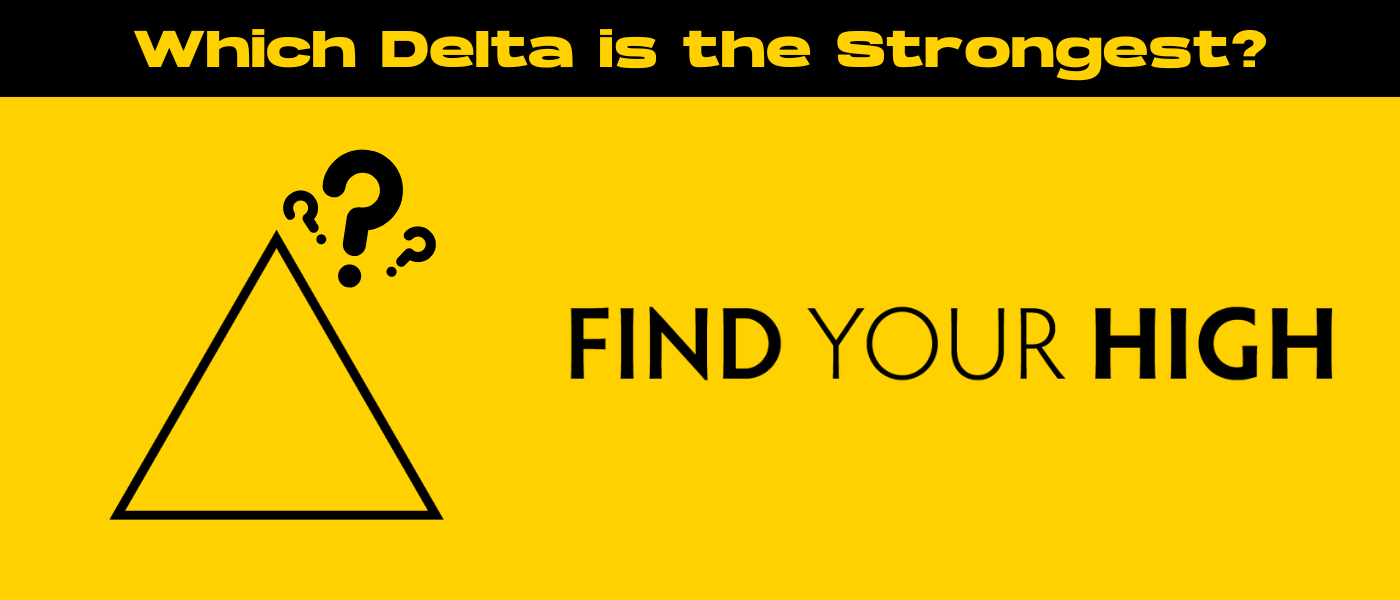Cannabinoids are a cool diverse group of chemical compounds that interact with the receptors in our brain and body, producing a range of effects. You’ll mostly find these compounds in the cannabis plant, and they’re making waves for their potential therapeutic and recreational perks.
In the cannabis and hemp world, cannabinoids are a big deal because of their varied effects and benefits, sparking tons of research and development. Among these, the delta varieties – Delta-8, Delta-9, and Delta-10 – have generated a lot of buzz and debate over their potency and effects. But which delta is the strongest?
These deltas are pretty similar in structure but have slight differences in the placement of a double bond, which makes a big difference in their effects and strength. Delta-9 THC is the most famous one, known for its strong psychoactive effects, but Delta-8 and Delta-10 are also gaining fans for their unique effects and potential benefits.
In this blog, we’re diving into the world of delta cannabinoids. We’ll break down their characteristics, benefits, and effects, and figure out which one is the toughest contender. So, keep reading to explore the different delta cannabinoids and find out which one comes out on top!
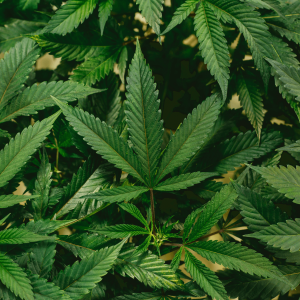
What Are Delta Cannabinoids?
Delta cannabinoids are a specific subset of cannabinoids that include Delta-8, Delta-9, and Delta-10 tetrahydrocannabinol (THC). These compounds interact with the endocannabinoid system in our bodies, producing various effects that can range from psychoactive experiences to potential therapeutic benefits.
It’s worth noting that they’re called “delta” because of the location of a particular double bond in their chemical structure.
Chemical Structure and Properties
Speaking of which… the chemical structure of delta cannabinoids is similar across the different types, but their effects can vary greatly due to slight differences.
For instance, Delta-8, Delta-9, and Delta-10 THC all have a double bond in slightly different positions on the carbon chain. This small difference plays a significant role in how each compound interacts with the body’s cannabinoid receptors, affecting their potency and overall effects.
Comparison with Other Cannabinoids (CBD, THC)
When comparing delta cannabinoids to other well-known cannabinoids like CBD (Cannabidiol) and regular THC (normally referring to Delta-9 THC), the differences become more apparent.
CBD is non-psychoactive and known for its relaxing and anti-inflammatory properties, making it popular for therapeutic use. On the other hand, Delta-9 THC is known for its strong psychoactive effects, offering users the “high” typically associated with cannabis.
Delta-8 and Delta-10 provide a middle ground, each offering unique psychoactive and medicinal effects, though generally less potent than Delta-9.
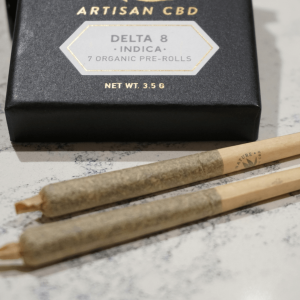
The Rise of Delta Cannabinoids
The history of delta cannabinoids is intertwined with the broader history of cannabis legalization and usage.
Delta-9 THC has been the most commonly known and studied until recently. However, as scientific interest in cannabinoids continues to grow, researchers have started focusing on the less understood Delta-8 and Delta-10 cannabinoids.
These compounds have been around for decades but are only now gaining prominence due to legal changes and shifts in public interest.
Changes in Legislation and Public Perception
Recent changes in legislation, particularly with the 2018 Farm Bill in the United States, have opened the doors for more widespread research and commercialization of hemp-derived cannabinoids. This law allowed for the federally legal cultivation of hemp, defined as cannabis with less than 0.3% Delta-9 THC, and inadvertently made way for Delta-8 and Delta-10 to enter the market legally.
As laws become more favorable, public perception is also shifting, with an increasing number of people curious about the benefits and effects of these lesser-known cannabinoids.
Delta-8 THC
Chemical Structure and Characteristics
Delta-8 THC is a minor cannabinoid found in hemp plants. Chemically, it shares a similar structure to Delta-9 THC, but the double bond is located at the eighth carbon chain instead of the ninth. This small difference might not seem like much, but it significantly alters its effects on the body.
Delta-8 is known for being less potent than Delta-9, providing a more mild, clear-headed high that users often describe as more manageable and relaxing. It’s also considered to have antiemetic (anti-nausea), anxiolytic (anxiety-reducing), and appetite-stimulating properties.
Methods of Extraction
Given that Delta-8 THC is only present in tiny amounts in the cannabis plant, its extraction involves some specialized processes.
It’s often derived from hemp through a process called isomerization, where CBD is converted into Delta-8 THC using solvents, acids, and heat. This process allows Delta-8 to be produced in sufficient quantities for commercial products, making it a more accessible option for consumers. Though this method is common, it requires precision and care to ensure the safety and purity of the end product.
Effects on the Body
In terms of effects, Delta-8 THC offers a gentler alternative to Delta-9 THC. Users commonly report a mild euphoria, increased focus, and a heightened sense of well-being. It’s less likely to induce anxiety or paranoia, which can be a downside for some users of Delta-9.
Moreover, Delta-8’s potential therapeutic benefits include relief from nausea and vomiting, making it a promising option for cancer patients undergoing chemotherapy. Its anxiolytic properties also make it appealing for those dealing with anxiety disorders or stress.
Legal Status
The legality of Delta-8 THC is somewhat murky. In the United States, the 2018 Farm Bill legalized hemp-derived cannabinoids, leading to the proliferation of Delta-8 products. However, Delta-8’s psychoactive properties have led to scrutiny and legal challenges in several states, prompting a patchwork of regulations.
Some states have explicitly banned or restricted Delta-8, while others allow its sale and consumption. As with many cannabinoid-related laws, the legal status of Delta-8 is continually evolving, influenced by new research, public opinion, and legislative changes.
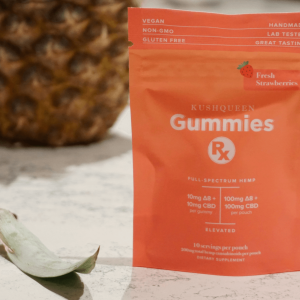
Delta-9 THC
Chemical Structure and Characteristics
Delta-9 THC is the most well-known and extensively studied cannabinoid, primarily responsible for the psychoactive effects associated with cannabis.
Its chemical structure features a double bond on the ninth carbon chain, setting it apart from other cannabinoids like Delta-8 and Delta-10. This double bond significantly influences its interaction with the body’s cannabinoid receptors, particularly the CB1 receptors in the brain.
The result is the potent psychoactive effects that Delta-9 is famous for, including euphoria, altered sensory perception, and increased appetite, commonly referred to as the “munchies.”
Methods of Extraction
Delta-9 THC is predominantly extracted from marijuana plants using various methods. The most common extraction techniques include CO2 extraction, ethanol extraction, and butane extraction.
CO2 extraction is considered the gold standard, as it produces high-purity THC without leaving behind solvents. Ethanol extraction is also popular due to its efficiency and cost-effectiveness, but it can sometimes leave trace amounts of ethanol in the final product. Butane extraction, while effective, poses higher risks due to the flammable nature of butane.
Each method has its pros and cons, but all aim to isolate Delta-9 THC in a potent form suitable for a wide range of products.
Effects on the Body
Delta-9 THC’s effects on the body are well-documented and include both recreational and therapeutic benefits. Recreationally, it is known for inducing a high characterized by euphoria, relaxation, and altered perception of time and space.
On the therapeutic side, Delta-9 THC has been found to help with chronic pain, muscle spasticity, and nausea, making it a valuable option for medical cannabis patients.
However, its potent psychoactive effects can also lead to side effects like anxiety, paranoia, and impaired short-term memory, which users should be mindful of.
Legal Status
The legal status of Delta-9 THC varies significantly across different jurisdictions. In the United States, it’s classified as a Schedule I controlled substance under federal law, making it illegal for medical or recreational use at the federal level.
However, many states have passed laws legalizing Delta-9 THC for medical and/or recreational use. This patchwork of state laws means that while Delta-9 might be perfectly legal in one state, it could be completely illegal in a neighboring one.
Internationally, its legal status also varies, with some countries allowing medical use while others maintain strict prohibitions.
Delta-10 THC
Chemical Structure and Characteristics
Delta-10 THC is one of the more recent cannabinoids to gain attention in the cannabis world.
Its chemical structure is similar to that of Delta-8 and Delta-9, but with the double bond located on the tenth carbon chain. This slight difference in molecular structure means that Delta-10 interacts with the body’s endocannabinoid system in a unique way.
Users report that Delta-10 offers an uplifting and energizing effect, often compared to a mild Sativa. It’s less potent than Delta-9 but offers a different kind of euphoria that can be appealing for those looking for a daytime cannabinoid.
Methods of Extraction
Like Delta-8, Delta-10 THC is not abundantly found in cannabis plants. Thus, it is usually produced through a conversion process from other cannabinoids, most commonly from CBD derived from hemp. This involves a similar isomerization process, using solvents and acids to rearrange the molecular structure of CBD into Delta-10 THC.
Because it’s a newer cannabinoid, the extraction methods are still being refined, but safety and purity remain top priorities for reputable producers.
Effects on the Body
Delta-10 THC is known for providing an uplifting, clear-headed high. Users often describe its effects as invigorating, making it a popular choice for daytime use. Unlike Delta-9, which can sometimes be overwhelming or induce couch-lock, Delta-10 offers a more functional experience.
It’s less likely to cause anxiety or paranoia, making it a favorable option for those sensitive to Delta-9’s stronger effects. In terms of potential therapeutic uses, Delta-10 may offer mood enhancement and mild pain relief, although more research is needed to fully understand its benefits.
Legal Status
The legal landscape for Delta-10 THC is still developing. Similar to Delta-8, it occupies a gray area in terms of legality.
The 2018 Farm Bill in the United States has indirectly allowed for the production and sale of Delta-10 as long as it’s derived from hemp and contains less than 0.3% Delta-9 THC. However, individual states have taken different approaches, with some explicitly banning Delta-10 while others have not addressed it specifically.
As research and public interest grow, the legal status of Delta-10 will likely continue to evolve, influenced by new findings and regulatory changes.
Comparing Deltas: Strength and Potency
When it comes to comparing the strength and potency of Delta-9, Delta-8, and Delta-10 THC, it largely hinges on their chemical structure and how they interact with the body’s endocannabinoid system.
Delta-9 THC is known to be the most potent, delivering strong psychoactive effects that many users are familiar with. On the other hand, Delta-8 provides a milder, more clear-headed high that is less likely to induce anxiety, making it a preferable option for some. Delta-10 offers an even lighter experience, often associated with an energizing, Sativa-like effect.
The method of consumption—whether smoking, vaping, or ingesting edibles—can significantly impact potency, with inhalation generally offering a quicker and more intense onset compared to edibles which are slower but longer-lasting.
Individual tolerance plays a vital role; regular users may require higher doses to achieve desired effects, while newcomers might experience potent effects even at lower doses.
The Science Behind Potency
Understanding the science behind the potency of different cannabinoids involves examining their interaction with the body’s endocannabinoid system. This system is responsible for maintaining physiological balance and includes receptors like CB1 and CB2, to which cannabinoids bind.
The binding affinity of a cannabinoid to these receptors significantly affects its potency—Delta-9 THC, for instance, has a high affinity for CB1 receptors in the brain, leading to its stronger psychoactive effects.
Metabolism and bioavailability also play crucial roles; cannabinoids are metabolized in the liver where enzymes like CYP450 break them down, affecting the overall potency. Additionally, the bioavailability of a cannabinoid varies depending on the method of consumption—smoking or vaping typically offers higher bioavailability compared to oral ingestion, impacting the strength and onset of effects.
These factors combined help explain why different cannabinoids exhibit varying levels of potency.
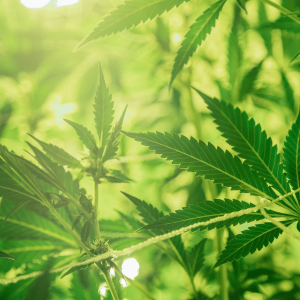
Safety and Side Effects
When exploring the world of delta cannabinoids, understanding the potential safety and side effects is crucial.
Common side effects reported by users include:
- Dry mouth
- Drowsiness
- Lightheadedness.
For some, higher doses can lead to mild anxiety or paranoia, especially with Delta-9 THC. While these effects are generally short-lived and manageable, it’s important to start with a low dose and gradually increase it based on your individual tolerance and response.
In terms of long-term health effects, research is still in its infancy. However, some studies suggest that prolonged and heavy use of Delta-9 THC could potentially lead to cognitive impairments and mental health issues like dependency.
Medical Benefits
Delta cannabinoids have shown promise in potentially treating a variety of medical conditions. Delta-9 THC has been widely studied for its effectiveness in alleviating chronic pain, reducing nausea and vomiting in cancer patients undergoing chemotherapy, and stimulating appetite in individuals with wasting syndromes.
Delta-8 and Delta-10 THC are gaining attention for their potential benefits in easing anxiety and providing moderate pain relief, without the intense psychoactive effects associated with Delta-9.
Ongoing research and clinical trials aim to further understand the full spectrum of medicinal uses for delta cannabinoids. These studies are crucial for substantiating anecdotal evidence and testimonials from users who have experienced significant relief from conditions like anxiety, epilepsy, and insomnia.
For instance, case studies have reported patients reducing their reliance on conventional pharmaceuticals by incorporating delta cannabinoids into their treatment regimens. As research evolves, it will be interesting to see how these cannabinoids may be integrated into broader medical practice.
Recreational Use
As Delta cannabinoids continue to carve out their niche in the recreational cannabis markets, their popularity is on the rise. Many people are turning to products like Delta-8 and Delta-10 for a smoother, more manageable high compared to traditional cannabis products. These newer cannabinoids provide a unique alternative for those who might find Delta-9’s effects too intense.
Innovations in Delta Cannabinoid Products
The world of delta cannabinoids is seeing some exciting innovations through both advanced extraction methods and novel product formulations. Here are a few key areas where we’re seeing the most progress:
- New Extraction and Synthesis Methods: Recent advancements in extraction techniques have made it possible to derive Delta-8 and Delta-10 THC more efficiently and at higher purity levels. These methods include advanced chromatography and new hemp-derived synthesis processes, ensuring cleaner and more potent products.
- Novel Product Formulations: The market is diversifying rapidly with an array of product options. You can now find edibles like gummies and chocolates, various vape cartridges, and tinctures that offer convenient and versatile ways to consume delta cannabinoids. These novel formulations are designed to cater to different user preferences, whether you’re looking for the simplicity of a vape or the long-lasting effects of an edible.
- Future Research and Development: As interest in delta cannabinoids grows, so does the focus on research and development. Future research is likely to delve deeper into understanding the full range of potential therapeutic benefits, optimizing extraction techniques, and creating even more innovative products. This ongoing development promises to refine and expand the options available to consumers.
Innovations in this space are set to enhance both the quality and variety of delta cannabinoid products, promising an exciting future for enthusiasts and newcomers alike.
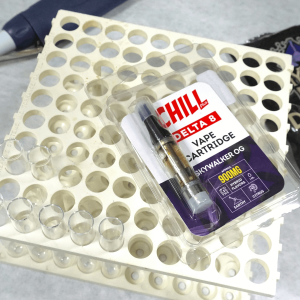
Conclusion: Which Delta is the Strongest?
So, which delta is the strongest? Well, it all boils down to understanding their unique properties. Delta-9 THC is known for its potent psychoactive effects due to its high affinity for CB1 receptors in the brain. This makes it the go-to for those seeking a strong high, although it can also be a bit overwhelming for some.
Delta-8 and Delta-10 THC, on the other hand, offer a more mellow experience, making them appealing to those who want the benefits without the intense effects of Delta-9.
Each type of delta cannabinoid brings something unique to the table, and the “strongest” really depends on what you’re looking for.
As the cannabis and hemp industry continues to evolve, we can expect ongoing innovation and research that will further define and expand the roles these cannabinoids play, ensuring there’s something for everyone.
Frequently Asked Questions
1. What is stronger, delta-8, 9, 10, or 11?
Delta-9 THC is generally considered the strongest among the commonly discussed delta cannabinoids. It has the highest psychoactive potency due to its high affinity for CB1 receptors in the brain. Delta-8 and Delta-10 THC are milder in their effects, offering a more subdued high. Delta-11 is less commonly discussed and researched, but current evidence suggests it doesn’t surpass Delta-9 in terms of strength.
2. What is the most powerful delta?
Delta-9 THC holds the title for being the most powerful delta cannabinoid. It delivers a potent psychoactive experience, which is why it’s the primary compound associated with the “high” from cannabis. Its strong effects make it popular for both recreational and medicinal use, but they can also be overwhelming for some users.
3. Is delta-9 or 10 stronger?
Delta-9 THC is stronger than Delta-10 THC. While Delta-9 is known for its intense psychoactive properties, Delta-10 offers a milder experience. People often choose Delta-10 for a more manageable high that allows for greater functionality and fewer psychoactive effects compared to Delta-9.
4. Is delta-8 stronger than delta-10?
Delta-8 THC is generally considered to be slightly stronger than Delta-10 THC. However, both are less potent than Delta-9 THC. Delta-8 provides a smoother and more laid-back experience, while Delta-10 is noted for its more uplifting and energizing effects. The choice between the two often comes down to personal preference and the desired experience.

 Rewards
Rewards




